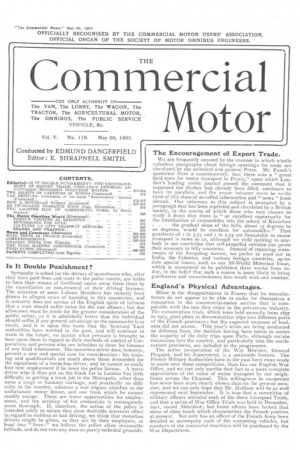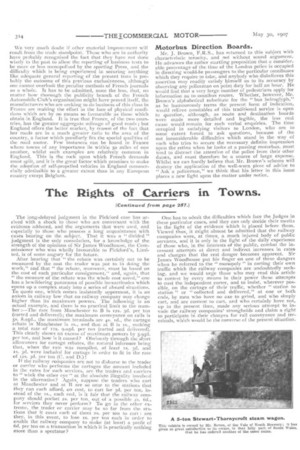Is It Double Punishment?
Page 1

Page 2

If you've noticed an error in this article please click here to report it so we can fix it.
Sympathy is asked for the drivers of motorbuses who, after they have paid fines and costs in the police courts, are liable to have their means of livelihood taken away from them by the cancellation or non-renewal of their driving licenses. The attention of some Labour Members has recently been drawn to alleged cases of hardship in this connection, and it certainly does not savour of the English spirit of fairness that a man should suffer twice for the one offence ; but due allowance must be made for the greater consideration of the public safety, as it is admittedly better that the individual should suffer if any general advantage to the community is to result, and it is upon this basis that the Scotland Yard authorities have worked in the past, and will continue to work in the future, no matter what pressure is brought to bear upon them in regard to their methods of control of Corporations and persons who are beholden to them for licenses of any kind whatsoever. The motorbus driver does, however, present a new and special case for consideration : his training and qualifications are much above those demanded for the equipment of a horse-bus driver, and he cannot so easily find new employment if he loses his police license. A horse driver who is thus put on the black list in London has little difficulty in getting a fresh job in the Metropolis, other than upon a stage or hackney carriage, and practically no difficulty in the country, whereas a real stigma attaches to the unfortunate motor driver, and one from which he cannot readily escape. There are fewer opportunities for employment, and the scrutiny of his credentials is consequently more thorough. If, therefore, the action of the police is intended solely to secure that most desirable deterrent effect in regard to reckless or bad driving, we think that motorbus drivers might be given, as they are by their employers, at least two " lives :" we believe the police allow reasonable latitude, and do not veto any man on purely technical grounds.
The Encouragement of Export Trade.
We are frequently amused by the manner in which wholly valueless paragraphs about foreign openings for trade are circulated by the technical and general Press. Mr. Punch's quotation from a contemporary, that there was a "great field open for motor transport in Persia," upon which London's leading comic journal passed the comment that it supposed the ditches had already been filled, continues to have its parallels, and the motor industry must be really tired of this class of so-called information and " news "from abroad. Our reference to this subject is prompted by a paragraph that has been reprinted and circulated by a British society, in the course of which those who may chance to study it learn that there is " an excellent opportunity for the introduction of automobiles into the colony of Kiauchau . . . the gradual slope of the hills, about 15 degrees to 20 degrees, would be excellent for automobiles." That gradients of i in 3.73 and t in 2.75 are favourable to motor transport is news to us, although we yield nothing to anybody in our conviction that self-propelled vehicles can prove their economy in hilly countries. Instead of repeating statements of the foregoing nature, we prefer to send out to India, the Colonies, and various foreign countries, up-todate special issues, such as our All-World Motorbus Issue, which is announced to be published three weeks from today, in the belief that such a course is more likely to bring purchasers and manufacturers into touch with one another.
England' s Physical Advantages.
-Bitter is the disappointment in France that its manufacturers do not appear to be able to make for themselves a reputation in the commercial-motor section that is comparable with the one they enjoy in the private-car industry. The consumption trials, which were held annually from 1897 to 1903, gave place to demonstration trips into different parts of the French provinces ; but the expected measure of business did not accrue. This year's trials are being conducted on different lines, the decision having been taken to centre the majority of the daily trips upon Paris, although certain excursions into the country, and particularly into the northeastern provinces, are included in the programme.
The active co-operation of the War Minister, General Picquart, and his department., is a noticeable feature. The French Military Authorities have in the past been more ready to assist over these competitions, than has our English War Office, and we can only ascribe that fact to a more complete appreciation of the value of motor transport by our neighbours across the Channel. This willingness to co-operate has never been more clearly shown than on the present occasion, and we can only hope that Mr. Haldane will be as well represented next September. It is true that a committee of military officers attended each of the three Liverpool Trials, and that a series of War Office Trials was held in December, I901, round Aldershot ; but home efforts have lacked that sense of close touch which characterises the French position at present. Not only has an officer of the French Army been detailed to accompany each of the competing vehicles, but numbers of the successful machines will be purchased by the War Department. We very much doubt if other material improvement will result from the trade standpoint. Those who are in authority have probably recognised the fact that they have not done wisely in the past to allow the reporting of business tests to be more or less monopolised by the sporting Press, and the difficulty which is being experienced in securing anything like adequate general reporting of the present tests is probably the outcome of this previous exclusiveness, although one cannot overlook the peculiar methods of French journals as a whole. It has to be admitted, none the less, that, no matter how thorough the publicity branch of the French Automobile Club's organisation might have proved itself, the manufacturers who are seeking to do business of this class in France are making the effort in the face of physical conditions which are by no means so favourable as those which obtain in England. It is true that France, of the two countries, has the greater aggregate mileage of good roads ; but England offers the better market, by reason of the fact that her roads are in a much greater ratio to the area of the country, a factor which peculiarly fits the special qualities of the road motor. Few instances can be found in France where towns of any importance lie within so miles of one another, whilst such examples are relatively common in England. This is the rock upon which French demands must split, and it is the great factor which promises to make the adoption of self-propelled vehicles in England commercially admissible to a greater extent than in any European country except Belgium.
Motorbus Direction hoards.
Mr. J. Brown, F.R.S., has returned to this subject with characteristic tenacity, and not without sound argument. He advances the rather startling proposition that a considerable percentage of the time of the London police is occupied in directing would-be passengers to the particular omnibuses which they require to take, and anybody who disbelieves this assertion may readily satisfy himself as to its accuracy by observing any policeman on point duty for half an hour. He would find that a very large number of pedestrians apply for information as to omnibus routes. Whether, however, Mr. Brown's alphabetical substitute for the " bus beiroglyph," as he humourouslv terms the present form of indication, would relieve constables of this traditional service is open to question, although, as route and destination boards were made more detailed and legible, the less real cause would remain for such verbal enquiries. The time occupied in satisfying visitors to London, who are to some extent forced to ask questions, because of the not inconsiderable difficulties which stand in the way of each who tries to secure the necessary definite impression upon the retina when he looks at a passing motorbus, must tend to distract the attention of the police from their other duties, and must therefore be a source of large expense. Whilst we can hardly believe that Mr. Brown's scheme will destroy the application of the well-worn piece of advice to " Ask a policeman," we think that his letter in this issue places a new light upon the matter under notice.


























